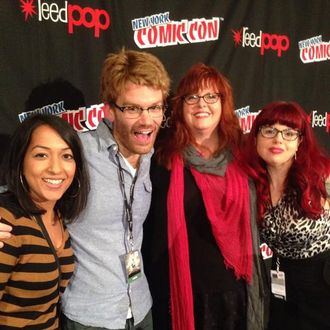
Yesterday afternoon, our resident comics expert Abraham Riesman moderated Vulture’s “Carol Corps and Beyond: The Future of Female Fandom” panel with Captain Marvel scribe Kelly Sue DeConnick, Red Sonja writer Gail Simone, and the editor of Captain Marvel and Ms. Marvel, Sana Amanat, to a packed house. (Seriously, I almost couldn’t get in.) During the Q&A, multiple audience members wanted to talk about intersectionality (cultural-studies crash course: “intersectionality” refers to the ways in which multiple strands of identity — race, class, gender, sexuality, etc. — that are often talked about separately are actually always confluent, or “intersectional”), prompting Riesman to comment, “How great is it that we’re at Comic Con and there have been multiple questions about intersectionality so far?”
“If you stand up for one minority and not believe in one minority and not believe in diversity and equality for all,” said Simone, “that doesn’t even make sense to me.” DeConnick agreed, saying that intersectionality is at the very core of what feminism is:
Feminism is about fairness, that championing only one aspect of that doesn’t make sense. That’s not fairness. I think we all have to, there are very few of us who do not carry some element of privilege even in our … ooh, how do I tread this carefully? Uh, look it’s super easy for me to … [long pause] I’m a white girl [audience laughs] is what I’m trying to say here. I’m a straight white girl. Life has not been that tough on me. I may not be playing the game on the easiest setting, but I’m not far down that list. So I think that we have a responsibility if we want the healthiest culture, if we want the best world for ourselves, each other, and our children to support all of us. And that means getting out of our comfort zones, that means giving a hand up to people who weren’t born with the advantages that we were.
The best exchange, though, came between one audience member and Amanat, woman of color to woman of color:
Q: How is it different for you, being a woman of color? Because I also am a woman of color, and I find that my experiences are different from those of white women.
Amanat: Different in terms of my job or just existing in the universe? [Audience laughs.]
Q: Sort of both. I mean, the new Ms. Marvel is a woman of color, and how she and characters like her are received, because a lot of times in feminism there is not intersectionality between white women and women of color, which is obviously a huge problem.
Amanat: I think it’s a very unique place to be because I’m sort of identifying with a few different minorities. Being a woman of color in particular is tough. Being a woman of color who is Muslim is really tough — especially right now. Ms. Marvel is sort of the anthem against a lot of hate that Muslims have received, quite frankly, to be blunt, and it’s very, very difficult. And I hate saying this, I absolutely hate saying this …
Riesman: Do it. [Audience laughs.]
Amanat: For me, I tape-measured myself against young girls who were white and looked nothing like me. Because that was sort of the ideal. The ideal was a blonde-haired, blue-eyed woman. And my niece has blonde hair and blue eyes, so nothing against that at all. But it was hard, because you never really measured up against that. And your version of beauty wasn’t what you looked like, and the media didn’t show that to you, either. So it took a really long time for me to feel comfortable in my own skin and to feel empowered in who I was. A very, very long time.
But the benefit of that, once I got out from under the covers and started feeling a little bit more comfortable in my own skin, it means that I can go through anything. I could sit at Marvel comics at a table with a group of a bunch of older white men and tell them I want to pitch a comic about a Muslim-American in a country where there’s hate ads for Muslims in the MTA — on the subway ads — they’re preaching hate for a group of people who represent the second-largest religion in the world. So it takes time, but I think you have to look at your core and find it. Dig, dig, dig deep and find it. And be okay with it. And that’s really not just a person of color’s struggle; it’s really everybody’s struggle.
Word.




